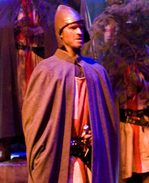SITE GUIDE
SEARCH
REVIEWS
REVIEW ARCHIVES
ADVERTISING AT CURTAINUP
FEATURES
NEWS
Etcetera and
Short Term Listings
LISTINGS
Broadway
Off-Broadway
NYC Restaurants
BOOKS and CDs
OTHER PLACES
Berkshires
London
California
New Jersey
DC
Connecticut
Philadelphia
Elsewhere
QUOTES
TKTS
PLAYWRIGHTS' ALBUMS
LETTERS TO EDITOR
FILM
LINKS
MISCELLANEOUS
Free Updates
Masthead
Writing for Us
A CurtainUp  London Review
London Review
 London Review
London ReviewDunsinane
|
A settled kingdom is one in which everyone is dead.
— Malcolm
|

Birnam Wood arrives at Dunsinane (Simon Annand) |
The situation is that the English army, under the leadership of Siward, the Earl of Northumberland (Jonny Phillips) are there to support King Malcolm's (Brian Ferguson) regime, to bring peace to the area after the death of Macbeth and to subdue the warring chieftains. Does this sound familiar? The parallels are there with Afghanistan and much is universally true for all time about the feelings of soldiers on occupation of a foreign land and their desire to get home.
Dunsinane opens with a young soldier describing the journey they have made by sea from the Essex coast to Fife in Scotland. In the Scottish seat of power they are surprised to find a woman, called in Gaelic, Gruach (Siobhan Redmond). She is the Queen, Lady Macbeth, not dead or mad as in Shakespeare's account but alive and with a 15 year old son (from her marriage to a king before Macbeth) who claims the throne.
The first act of the play sees Siward's negotiations with the forceful Queen and the new King Malcolm, an Anglophile who escaped to England after the death of his father Duncan. Malcolm is weak and duplicitous, vacillating and lackadaisical, but candid for all that. "I will govern entirely in the interests of ME." he says. Siward is a noble man, good, honest and true.
Siward's political solution that Gruach should marry Malcolm and that Gruach's son should be adopted by Malcolm as his heir, while sounding neat, like all compromises pleases neither side. The marriage dance is rudely interrupted by an attack from Gruach's forces and her ear splitting banshee wail heralds much slaughter.
Whilst the first act is about achieving peace the second is about war and reprisals and how the invading army sees their hopes of going home slipping away. As Siward tells Egham (Alex Mann) about the burning of the people alive, Egham comments wryly "It's a bit Scandinavian, isn't it?" Egham had intended to be a monk before he is called upon to carry out the audit of Scottish valuables, a commercial role which he settles into with relish.
The task of identifying Gruach's concealed son and heir goes very wrong when the singular identifying tattoo of three snakes devouring a moon is found on all the boys. Even after the death of the 15 year olds, Gruach claims there is another heir, a baby. This information combined with the warring clans starts to make Siward's task impossible and he is forced to compromise his earlier principles. Is this the inevitability of a war fought over mountainous territory with pockets of insurgency?
Siobhan Redmond witing witch Queen, some of her lines in Gaelic and as good a strategist as any of the men. Her final threat to send raiding parties across the border into Siward's Northumberland seems likely to happen. I liked too Jonny Phillips' Siward with his qualities of leadership and integrity contrasting with Brian Ferguson's brilliantly shallow and pragmatic Malcolm. But concentrating on these main characters, leaves out the undoubted strength of the debut performances from young actors, some of whom are still in training at drama school, playing the English soldiers and speaking David Greig's beautifully descriptive, resonating narratives.
Roxana Silbert gives us a powerfully tight production set on the granite stage with a flight of steps dominated by a large Ionian Cross. David Greig's script may be studied to pick up on the clever references back to Shakespeare's Macbeth for instance when Gruach shows Siward her open but spotless hands!
The Boy Soldier (Sam Swann) asks the perpetual question, "Why are we here? Why are we here? Why are we here?"
|
Subscribe to our FREE email updates with a note from editor Elyse Sommer about additions to the website -- with main page hot links to the latest features posted at our numerous locations. To subscribe,
E-mail: esommer@curtainup.comesommer@curtainup.com
put SUBSCRIBE CURTAINUP EMAIL UPDATE in the subject line and your full name and email address in the body of the message -- if you can spare a minute, tell us how you came to CurtainUp and from what part of the country. |
| Dunsinane
Written by David Greig Directed by Roxana Silbert Starring: Brian Ferguson, Jonny Phillips, Siobhan Redmond With: Jacob Anderson, Lisa Hogg, Joshua Jenkins, Tony McGeever, Alex Mann, Mairi Morrison, Daniel Rose, Ewan Stewart, Sam Swann English Army: Michael Amaning, Martin Bassindale, Joshua Campbell, Benjamin Cawley, Cass Chaplin, Rasfan Haval, Jeremy Irvine, Malachi Kirby, Christian Kyriacou, Jay Mair, Hauk Pattison, Tom Ross-Williams Design: Robert Innes Hopkins Lighting: Chahine Yavroyan Music and Sound: Nick Powell Movement: Anna Morrissey Fights: Terry King Running time: Two hours 35 minutes with one interval Box Office: 020 7722 9301 Booking to 6th March 2010 Reviewed by Lizzie Loveridge based on 17th February 2010 performance at the Hampstead Theatre, Eton Avenue, Hampstead, London NW3 3EU (Tube: Swiss Cottage) |
|
REVIEW FEEDBACK Highlight one of the responses below and click "copy" or"CTRL+C"
Paste the highlighted text into the subject line (CTRL+ V): Feel free to add detailed comments in the body of the email . . . also the names and emails of any friends to whom you'd like us to forward a copy of this review. |
|
London Theatre Tickets Lion King Tickets Billy Elliot Tickets Mighty Boosh Tickets Mamma Mia Tickets We Will Rock You Tickets Theatre Tickets |




